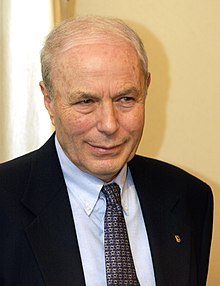Avram Hershko
Avram Hershko | |
|---|---|
 | |
| Born | Herskó Ferenc 31 December 1937 Karcag, Hungary |
| Nationality | Israel |
| Known for | ubiquitin-mediated protein degradation |
| Spouse |
Judith Leibowitz (m. 1963) |
| Children | 3 |
| Awards | Nobel Prize in Chemistry (2004) |
| Scientific career | |
| Fields | Chemistry |
Avram Hershko (Template:Lang-he; born 31 December 1937) is a Hungarian-born Israeli biochemist and Nobel laureate in Chemistry.
Biography
Hershko was born Herskó Ferenc in Karcag, Hungary, the son of Shoshana Margit and Moshe Hershko, both teachers.[1] Hershko emigrated to Israel in 1950. He received his M.D. in 1965 and his Ph.D in 1969 from the Hebrew University-Hadassah Medical School, Jerusalem, Israel. He is currently a Distinguished Professor at the Rappaport Faculty of Medicine at the Technion in Haifa.
Along with Aaron Ciechanover and Irwin Rose, he was awarded the 2004 Nobel Prize in Chemistry for the discovery of ubiquitin-mediated protein degradation. The ubiquitin-proteasome pathway has a critical role in maintaining the homeostasis of cells and is believed to be involved in the development and progression of diseases such as cancer, muscular and neurological diseases, and immune and inflammatory responses.
His contributions to science directly helped cure one of his long-time friends of cancer. [2]
Honours and awards
- 1987 – Weizmann Prize for Sciences (Israel)
- 1994 – Israel Prize in biochemistry[3]
- 1999 – Gairdner International Award Canada (with A. Varshavsky)
- 2000 – Albert Lasker Award for Basic Medical Research (with A. Ciechanover and A. Varshavsky).
- 2001 – Louisa Gross Horwitz Prize from Columbia University
- 2001 - Massry Prize from the Keck School of Medicine, University of Southern California
- 2001 – Wolf Prize in Medicine (Israel), jointly with Alexander Varshavsky, for 'the discovery of the ubiquitin system of intracellular protein degradation and the crucial functions of this system in cellular regulation."[4]
- 2003 – Foreign Associate, National Academy of Sciences, USA
- 2004 – Nobel Prize in Chemistry for his discovery with Aaron Ciechanover and Irwin Rose, of ubiquitin-mediated protein degradation.[5][6]
Publications
- Hershko, A., Ciechanover, A., Heller, H., Haas, A.L., and Rose I.A. (1980) "Proposed role of ATP in protein breakdown: Conjugation of proteins with multiple chains of the polypeptide of ATP-dependent proteolysis". Proc. Natl. Acad. Sci. USA 77, 1783–1786.
- Hershko, A., Heller, H., Elias, S. and Ciechanover, A. (1983) Components of ubiquitin-protein ligase system: resolution, affinity purification and role in protein breakdown. J. Biol. Chem. 258, 8206–8214.
- Hershko, A., Leshinsky, E., Ganoth, D. and Heller, H. (1984) ATP-dependent degradation of ubiquitin-protein conjugates. Proc. Natl. Acad. Sci. USA 81, 1619–1623.
- Hershko, A., Heller, H., Eytan, E. and Reiss, Y. (1986) The protein substrate binding site of the ubiquitin-protein ligase system. J. Biol. Chem. 261, 11992-11999.
- Ganoth, D., Leshinsky, E., Eytan, E., and Hershko, A. (1988) A multicomponent system that degrades proteins conjugated to ubiquitin. Resolution of components and evidence for ATP-dependent complex formation. J. Biol. Chem. 263, 12412-1241.
- Sudakin, V., Ganoth, D., Dahan, A., Heller, H., Hershko, J., Luca, F.C., Ruderman, J.V. and Hershko, A. (1995). The cyclosome, a large complex containing cyclin-selective ubiquitin ligase activity, targets cyclins for destruction at the end of mitosis. Mol. Biol. Cell 6, 185–198.
Involvement with biotechnology
Professor Hershko serves on the Scientific Advisory Board of Oramed Pharmaceuticals.
See also
References
- ^ http://www.nobelprize.org/nobel_prizes/chemistry/laureates/2004/hershko-autobio.html
- ^ Friedman, Sally (September 13, 2011). "Nobel Prize winner's discovery helps save longtime physician friend". Burlington County Times. phillyBurbs.com. Retrieved May 15, 2012.[permanent dead link]
- ^ "Israel Prize Official Site – Recipients in 1994 (in Hebrew)". Archived from the original on 2008-12-27.
{{cite web}}: Unknown parameter|deadurl=ignored (|url-status=suggested) (help) - ^ Wolf Prize Recipients in Medicine Archived February 26, 2009, at the Wayback Machine
- ^ Nobel citation
- ^ Avram Hershko & Aaron Ciechanover, 2004 Nobel in Chemistry Archived December 19, 2005, at the Wayback Machine – A web article
External links
- Nobel Prize lecture
- Website at the Technion
- Avram Hershko's short talk: "Lessons from My Life in Science"
- "Hungarian" Nobel Prize winners Crooked Timber
- Avram Hershko Jewish Virtual Library
- Ubiquitin-Mediated Protein Degradation: From the lab to the bedside Dan Hersko
- The Official Site of Louisa Gross Horwitz Prize
- 1937 births
- Living people
- Hebrew University of Jerusalem alumni
- Hungarian biochemists
- Hungarian emigrants to Israel
- Hungarian Jews
- Hungarian Nobel laureates
- Israel Prize in biochemistry recipients
- Israeli biochemists
- Israeli Jews
- Israeli Nobel laureates
- Israeli physicians
- Jewish chemists
- Members of the European Molecular Biology Organization
- Members of the Israel Academy of Sciences and Humanities
- Members of the United States National Academy of Sciences
- Foreign Members of the Chinese Academy of Sciences
- Nobel laureates in Chemistry
- People from Haifa
- People from Karcag
- Technion – Israel Institute of Technology faculty
- Wolf Prize in Medicine laureates
- Recipients of the Albert Lasker Award for Basic Medical Research
- Massry Prize recipients
- Holocaust survivors

